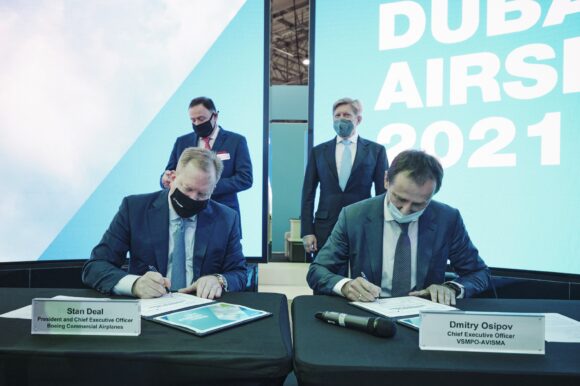
MSN10499 A321neo S7 Airlines delivery scaled
Airbus is closely monitoring the situation around Russia but says it is too early to comment on the effects of the sanctions that have been imposed by the European Commission since last Friday. These sanctions prohibit the sale and trade of aircraft and aircraft parts to Russian airlines by aircraft manufacturers, suppliers, and lessors as well as the ban of all Russian airliners and business jets in EU airspace. Impact of sanctions on Airbus and Boeing still unclear.
AirInsight asked Airbus today about the impact of these sanctions. In an email, a spokesperson replies: “We are monitoring the situation closely together with our partners, customers, and suppliers. It is premature to comment in detail about the impact of sanctions on our industry. We are analyzing the impact of the sanctions that have been announced since the start of the situation and we will fully comply with all sanctions and applicable laws, once they are in force.”
Airbus is exposed to Russia in various ways. First, through aircraft that are on direct order, but these are limited as most airliners in the country are leased. The spokesperson confirms our previous report that it has unfilled orders from Aeroflot for the A350-900. Of 22 aircraft on order, nine have been delivered, including the one that was delivered late on Thursday 24.
Sanctions will prohibit the deliveries of the remaining A350s, which include a number of frames that have already been produced: MSN457 (first flight on October 26, 2021), MSN463 (November 15), MSN466 (January 21), MSN471 (February 15), plus yet to fly MSN493.
The spokesperson says that Airbus is also exposed to some forty A320neo-family aircraft from lessors. From the non-exhaustive production list on Planespotters, we identify the following A320neo’s that are currently in production: MSN10546 (first flight February 24), MSN10731 (January 5) for Siberia Airlines S7, plus MSN10712 (January 25), and MSN10786 (February 15) for Smartavia.
As reported, AerCap is the most-exposed in Russia, with some 149 leased to Russian airlines according to AirfinanceJournal. AerCap said today that it will fully comply with EU sanctions and cease leasing activities with Russian airlines. The lessor said that five percent of its fleet by book value has been leased to airlines like Aeroflot and S7. SMBC and ALC also have double-digit portfolios in Russia.
Titanium from Russia
With a ban on the trading of aircraft parts, not only will Airbus and its suppliers be unable to support Russian airlines with spare parts but they will also have to cease taking deliveries from suppliers. One of them is VSMPO-AVISMA, a Verkhnaya Salda (Sverdlovsk) based tier 1 supplier of aluminum and titanium parts that is 25 percent-owned by state corporation Rostec. Only last January 19, the Russian company extended its supply contract until 2028 with Spanish company Aernnova Aerospace for titanium stampings for the A350.
“Our exposure is a mix of Airbus directly sourcing titanium from Russia, as well as indirect sourcing from our Tier 1 suppliers”, says Airbus. “Geopolitical risks are integrated into our titanium sourcing policies. We are therefore protected in the short and medium-term.”
In November, Boeing Commercial Airplanes CEO Stan Deal (left) and VSMPO-AVISMA CEO Dmitri Osipov signed an MoU to extend their Ural Boeing Manufacturing joint-venture. (Boeing)
Boeing recently extended Russian partnership
VSMPO-AVISMA not only produces parts for Airbus, but also for Boeing, Embraer, Safran, and Rolls-Royce. Previous contracts also included engine makers General Electric and Pratt & Whitney and the supply of compressor disks and fan blades for aero-engine and gas turbine plants.
During last November’s Dubai Airshow, the company and Boeing announced an extension of Ural Boeing Manufacturing joint-venture “for years to come.” A Memorandum of Understanding covered the supply of titanium of current and future commercial aircraft programs, including the 737/MAX, 767, 777/777X, and 787, making the Russian company the largest supplier of titanium parts to Boeing. The two companies would also work together on new alloys and technologies. In a press statement at the time, Boeing Commercial Airplanes CEO Stan Deal described VSMPO-AVISMA as “a reliable and valuable partner to Boeing for almost 25 years.”
Boeing has 34 aircraft on direct order to Russian airlines, including 28 MAX to UTAir Aviation and six 777Fs to Volga-Dnepr UK. UTAir also has three MAX 8 on order through Aviation Capital Group (ACG), but following the grounding of the type in 2019 they were stored. Siberian Airlines S7 has taken delivery of two aircraft in late 2018, with thirteen more on order via Air Lease Corporation (ALC) and AerCap. The MAX production list shows three future deliveries via ACG to Nordstar Airlines, plus three to Ural Airlines via Sberbank Leasing. This bank is on the US and EU sanctions lists. Russia is the only country that has yet to recertify the MAX. No 777F show up on the short-term production list. AirInsight has not received answers to questions from Boeing.
An Embraer spokesperson says that the Brazilian airframer will not be affected if titanium supplies from Russia dry up: “We don’t expect to be impacted. While we watch the situation closely, we have no current concerns and have large stocks in place.”
Views: 9




